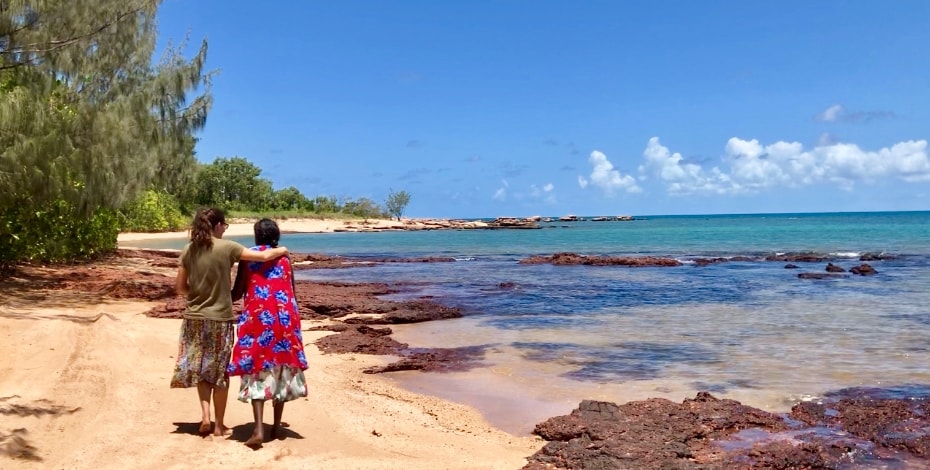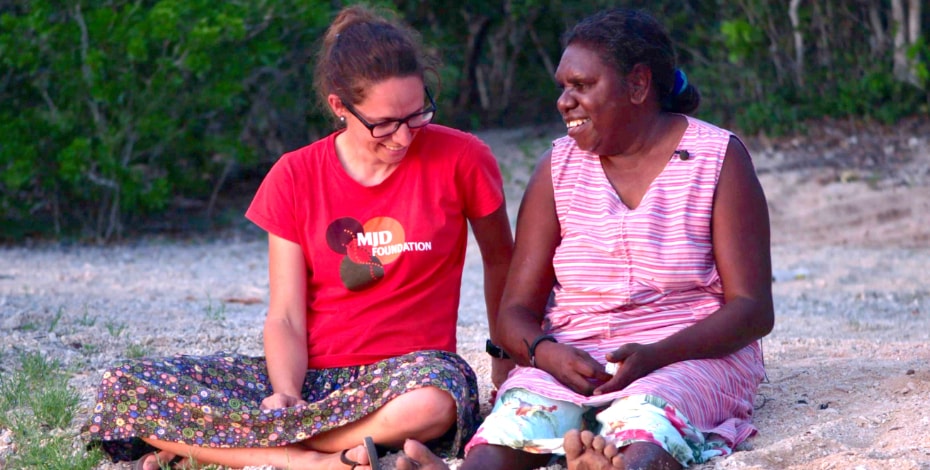
Toolbox is readied to fight familial disease

Groote Eylandt and Machado-Joseph Disease were words Jen Carr was not especially familiar with in 2015. But by 2017, the physiotherapist and researcher was living on the remote island in the Gulf of Carpentaria off the Northern Territory. Jen was working alongside families affected by the disease who were developing invaluable tools to keep walking and moving around. Melissa Mitchell reports.
Gayangwa Lalara is now in her 70s and she has seen more than her fair share of family members pass away as a result of the highly disabling Machado-Joseph Disease (MJD). First it was her siblings; Gayangwa is now only one of two surviving siblings from her family of 11 brothers and sisters. And the septuagenarian is watching as the next generation, her nieces and nephews, living with the hereditary condition. This family tragedy has been unfolding for decades on Groote Eylandt, about 50 kilometres off-shore from mainland Northern Territory.
Although found in almost every continent of the world, MJD reaches its highest prevalence in affected Aboriginal communities across the Top End of Australia, such as Groote Eylandt.
The inherited neurodegenerative disease, also known as spinocerebellar ataxia 3, is characterised by progressive loss of mobility and coordination of movement. From diagnosis, mean life expectancy is around 20 years and people with the condition live with a high degree of disability for an extended period of time.
James Cook University PhD candidate and Gold Coast Hospital physiotherapist Jen Carr, together with community research partner Joyce Lalara, published on the topic as co-leads on the research paper ‘Staying strong inside and outside: Perspectives of Aboriginal families with MJD’ in March this year. Jen was invited to be part of this project by the MJD Foundation, on behalf of Aboriginal families living with MJD from Groote Eylandt. back in 2015. Before starting the project Jen shot a little video about herself, and sent it to the families so they could decide if Jen was the right person to work with them.
Since then, Jen has worked alongside these families, being guided by them and learning their language of Anindilyakwa, the language spoken on the Groote Eylandt Archipelago.

Jen and Joyce relax and chat on the beach. Picture: Ayangkidarrba-langwa Media — Mario Naritajuruwa Faggion
Jen took leave from her hospital job and travelled to the island after first meeting the local researchers via Zoom. Prior to Jen joining the team, important groundwork had already been done by the many family members with MJD from Groote that had worked with the MJD Foundation and physiotherapist Nick Kenny as far back as 2008. Jen has been working closely with families to ensure the research is being conducted according to their priorities, to work out the best ways to keep their families walking and moving around as long as possible while living with this terrible disease.
‘People had been talking about their disease for a while, but didn’t know it was in fact MJD until relatively recently when the diagnosis of MJD was made. Before that, no one knew what it was including affected families on Groote Eylandt. People called it Groote Eylandt syndrome and thought maybe it was related to manganese mining on the island,’ Jennifer says. ‘Then, finally, in the mid-1990s, the disease was genetically confirmed and the autosomal dominant nature of the it explained the pattern of the disease throughout the affected families.
‘Families felt strongly that the more they moved around, the more it would slow the progression of their disease. There are some people who worry about sitting still too much because they feel the longer they’re sitting still, the more this disease will “cover them”. They knew that exercise was helping them, but they also wanted to find out other ways that could help.’
Jen teamed up with and was supported by Joyce Lalara, an Aboriginal woman living on Groote Eylandt who has MJD. Joyce has worked for the MJD Foundation since 2011 as a community worker and has supported families with the disease for many years. After spending time together on the island for several weeks, and securing a research grant from the Lowitja Institute and seed funding from the MJD Foundation and the Anindilyakwa Land Council, Jen and Joyce set about working alongside Aboriginal families on Groote Eylandyt and in Ngukurr (on mainland Northern Territory) to work out the best ways to keep families with MJD walking and moving around. Together the families identified what works best to keep people with MJD walking and moving around while still engaging in activities such as fishing, hunting and going bush. This community-driven, collaborative project led to the development and trial of the Staying Strong Toolbox, a physical activity and lifestyle program for Aboriginal families with MJD.
In partnership with families living with MJD from Groote and Ngukurr, Jen and Joyce created the Staying Strong Toolbox by combining the knowledge of Aboriginal families from the Top End who’ve lived with the disease for generations with knowledge gathered from the Western scientific domain.
‘The circumstances people are in couldn’t be any more challenging— our families live in very remote communities; it’s hot; the environment is harsh and equipment has a really hard life because of dust, heat, sand, rocks and water,’ Jennifer says. ‘If you’re at the end stages of life with a neurodegenerative disease in a metropolitan area, you can readily access care providers and support services but services are limited in these remote communities, and there’s no 24-hour care currently available. People have to move to the city, away from family and country, where no one speaks their language as the disease progresses.’
As there is currently no cure for MJD, supporting families to keep strong inside and out so they can keep walking and moving around and living a good life is the priority, Jen says. ‘Physiotherapists
are in one of the best positions to find out what matters to people and support them to do whatever that is. You have to work inter- professionally to do this well, especially if you’re in a remote area. You’ve got to loosen up your boundaries and just make sure you’re being helpful … we can do a lot around the accessibility of services. We have a lot to offer as physios.’
Part of the project included the creation of a video that was funded through a knowledge translation grant form the Lowitja Institute. Watch the trailer below.
‘The Lowitja Institute said “We want this funding used to help you get your message out there but we want you to think outside the box, not just about conferences or journal articles”, so I sat down with Joyce and families and said “Okay, what do you want to do?”, and they said “Let’s make a YouTube video. We want to spread the news around the world. We want everyone to see it”. I had no clue how to even make a YouTube video but the families want everybody— from physios, nurses, any health professionals in
other parts of the world, carers, supporters of people with MJD, friends, anybody—to know about the disease, what they can do to support people and how they might be able to help. We wanted to send it out everywhere and share it as widely as possible,’ Jen says.
The video has participants tell their stories in Anindilyakwa, opening with the story of Joyce. Joyce explains that her symptoms first presented as being unsteady on her feet, and she says that with the help of physiotherapy she was able to slow the progression of those symptoms. For Joyce’s aunty Gayangwa, she recounts how the sickness didn’t have a name for a long time but that the community rallied to help those affected by it regardless. Their stories are powerful and are told to add to the pool of knowledge around the world about MJD.
This month, the MJD Foundation, with the Israeli MJD Association, is hosting the 2019 International MJD Research Conference on 12–13 November as a satellite meeting of the International Ataxia Research Conference being held in Washington, DC, US, on 14–16 November.
Jen and Joyce will travel to the US for the conference, and will present their research. ‘Joyce has just got her first passport, she’s never been overseas before. Joyce is in a wheelchair but it doesn’t stop her. It’s going to be a big trip, and it will be freezing in Washington in November—it’s going to be quite an adventure,’ Jen says.
© Copyright 2025 by Australian Physiotherapy Association. All rights reserved.





